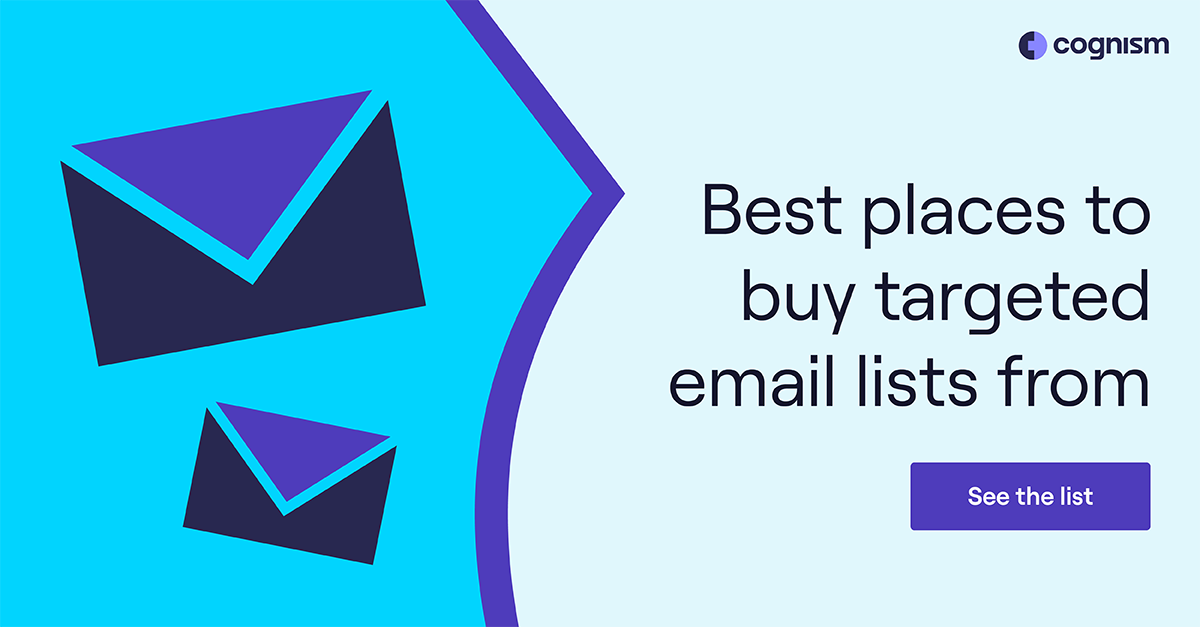20 Top Tips For Picking Email List Sellers
20 Top Tips For Picking Email List Sellers
Blog Article
What Factors Should I Be Thinking About When Buying What Should I Consider When Purchasing A Cpa Email List?
It is important to consider these aspects before buying an email list of CPAs (Certified Public Accountants):1. The list must meet all legal requirements, and be relevant to your marketing goals. The most important thing to consider is: 1. Data quality and accuracy
Verify where the data is sourced from. Trustworthy providers usually collect information from legitimate sources like professional directories, trade associations or databases. Avoid lists created through scraping or unreliable means, as they may include outdated or incorrect information.
Verification process: Examine to see if your email list has been validated recently. This will reduce the bounce rate and ensure you reach valid, active email addresses. Ask whether the list is regularly maintained and cleaned, since CPAs are often changing their jobs or companies.
Segmentation and Filters - A great CPA list will provide ways to segment your audience, including specific industry, location as well as years of experience or firm size. Tailored targeting using these parameters can enhance the effectiveness of your campaigns.
2. Legal Regulations
Data Privacy Laws: Ensure that the email list is compliant with data protection laws such as the General Data Protection Regulation (GDPR) and the California Consumer Privacy Act (CCPA), and any other local laws that are relevant. Lists should only contain emails legally obtained, and only with consent.
Compliance to CAN SPAM Act: To ensure that U.S. campaigns comply with CAN SPAM Act, which regulates commercial email communication, the list needs to be in compliance. This includes providing opt-out mechanisms and not using misleading subject lines or other content. Non-compliance is punishable by fines as well as other legal concerns.
Opt-in Consent - Ensure the email addresses are obtained by opt-in consent. The recipients must have given their consent to receive emails that are sent out by third-party marketing. This lowers the chance of spam complaints and increases engagement.
3. Provider Reputation
Examine the credibility of the company. You can assess previous customer experiences by checking reviews, case studies and testimonials. Established firms are more likely to supply accurate, high quality data.
Transparency - The service provider should be transparent about how data is gathered and how it is updated. If the company is unable to explain clearly their process and the reasons behind it, they should be flagged as a red-flag.
Customer Support: A dependable customer support service is essential for those who require help with customizing lists, troubleshooting or understanding compliance regulations. A good support team can reduce time and effort during the campaign process.
4. Cost and ROI
Pricing Models. Providers provide a variety of pricing options. Some charge per contact; others have per-contact fees or a subscription. Examine the costs and ROI you expect, while making sure to balance price with the quality of the list.
Refund Policy: Find out the policy to refund or replace items when a number of emails are incorrect or in error. A guarantee can provide you with peace of mind.
Cost vs. Quality: Don't just concentrate on the price. The list that is less expensive may be appealing, but it may result in low participation or high bounce rates when it's of poor quality. Make sure to choose lists with high quality, data accuracy, and segmentation value.
5. Ownership and usage of data
Is it a single-use or multiple-use? Find out if you are buying the list only for one use or if the list is yours to use and you are able to make use of it in ongoing campaigns. Although a list for single-use is cheaper, owning your list lets you run longer-term campaigns.
Shared lists: Find out whether your list of email addresses is shared or exclusive. Shared Lists: Identify if the email list is only available to you or shared with other buyers. Shared email lists can result in audience fatigue when recipients are bombarded with emails from different organizations.
6. Data Integration and Format
CRM Compatibility: Ensure that the list is provided in a format compatible with the CRM software or marketing email, such as CSV or Excel. This ensures an easy import and administration of the data.
Simple of Use: Examine the ease with which you can organize and manage the data once it's been integrated into your system. A well-organized database can enhance the effectiveness of targeting and personalization.
7. Ethical Aspects
Relevance and the value of content: Because CPAs work hard It is vital to send out content that is both relevant and valuable. Avoid sending irrelevant emails that can harm your reputation or result in complaints about spam.
Avoid over-emailing: Be aware of the frequency with which you send emails to the people you have on your list. Insufficient communication can lead to complaints about spam and unsubscribes. It can also adversely affect the reputation of the person who sent it.
Conclusion
When you purchase an CPA email list, consider the quality of data legal compliance, data quality, and the reputation of the company to ensure that your investment will be profitable. Segmentation, targeting, and ethical practices will maximize engagement, ROI, and image of the brand. Take a look at the top cpa email list for more info.
What Are The Important Things I Need To Consider Prior To Purchasing An Oncologist's List?
You should consider the following factors before purchasing an oncologist's email list. These will aid you in ensuring that the list you purchase is targeted, high-quality and legally legal. Here are some important factors to consider. Quality of data and accuracy
Source of Data: Check that the information comes from reliable and trustworthy sources like professional associations, medical directories or databases of healthcare. Do not use lists from unreliable or unreliable sources. They could be inaccurate and outdated information.
Verification Method: List providers must adopt a rigorous process to confirm that the email addresses they supply are correct, authentic and in use. The provider should periodically update and clean the list in order to get rid of any invalid or duplicate addresses.
Segmentation. A quality oncologist's email list should provide segmentation. Being able to filter the list by subspecialties (e.g., pediatric oncology, surgical oncology, hematology-oncology), geographic location, years of experience, or institution allows for more targeted outreach, increasing the likelihood of engagement.
2. Legal Regulations
Data Privacy Regulations â Ensure that your email list is compliant with regulations on data privacy, such as the General Data Protection Regulations in Europe and the California Consumer Privacy Acts of the U.S. Email addresses should be recorded, processed and stored in accordance with the law.
CAN SPAM Act Compliance: Check that all your campaigns in the U.S. comply with the CAN SPAM Act, which regulates commercial email communication. It is crucial to include an explicit opt-out button in every email. Also, ensure that the subject lines of your emails are accurate and do not fool recipients. Infractions can result in fines and may damage your reputation.
Opt-In Consent: Check to see if all the addresses on the list were collected by opt-in consent. Oncologists are required to have given consent for marketing communications. This will ensure compliance with privacy legislation and reduce the possibility of receiving spam complaints.
3. Provider Reputation
Reputable List Provider: You must purchase your information from a list provider who has a good track record in the industry. You can assess the reliability of a service by looking at their history as well as their reviews, testimonials as well as case studies. Established firms are more likely to provide complete and legally-compliant lists.
Transparency. The service provider must provide information about the source of their data, how frequently they are updated, and what verification methods they employ. Transparency issues could be a red flag and signal low-quality data.
Customer Support: Choose an online vendor that can provide prompt customer support in the event you require help with your checklist, or if there are concerns regarding integration or segmentation.
4. Cost and Return on Investment
Pricing Structure: Understand the pricing model, whether it is based on contact fixed fees or subscriptions. It is important to consider whether the cost is in line to your marketing budget as well as your expectations for return on investment (ROI).
Refund or Replacement Policy: A trusted provider will offer a refund or replacement policy for invalid or outdated email addresses that are not valid or outdated. To safeguard your purchase be sure to read the terms.
Don't solely focus on cost. It's tempting to buy a cheaper list, but it could cause your campaign damage if results are poor deliverability and low participation. To ensure that the list is of high quality ensure that it has pertinent and accurate information.
5. Ownership and Use of Data
Single-Use and. Multi-Use: Make sure you know whether the list is intended for single-use, or if it has ownership of the list for continuous usage. A list that is owned by you can offer greater flexibility and value if you are planning multi-campaigns.
Exclusive vs. Shared Lists: Determine whether the list is only available to you or is sold to many buyers. Exclusive lists tend to be more valuable because they lessen crowd fatigue, leading to greater engagement.
6. Data Format and Integration
CRM Compatibility. Make sure you are able to import the list easily into your CRM system or emailing software. For seamless integration the list should be in a format that is standard like CSV or Excel.
Simplify Segmentation : The list needs to be easy to manage, segment and organize within your CRM. It will be simpler to customize your campaign by filtering quickly on criteria such as geographical location or subspecialties in oncology.
7. Ethical Concerns
Relevance in messaging Oncologists are highly skilled professionals with very busy schedules. Be sure that your message is pertinent to their work or interests, such as medical equipment, continuing education, or pharmaceutical advancements. Unrelated emails can harm your reputation and cause low engagement.
Avoid Spam. Avoid sending too many emails or send out spam emails. They could result in spam complaints. Be sure to maintain a reasonable frequency of email to keep your customers interested without overburdening them with messages.
Conclusion
When you purchase an oncologist's email list, consider accuracy of the data, legal compliance, and provider reputation. Be sure that the list has been designed to be segmented and tailored to your target audience. You can develop a compliant efficient outreach strategy by analyzing these factors. This will boost engagement and result in impressive outcomes. Check out the most popular oncologist email list for site advice.